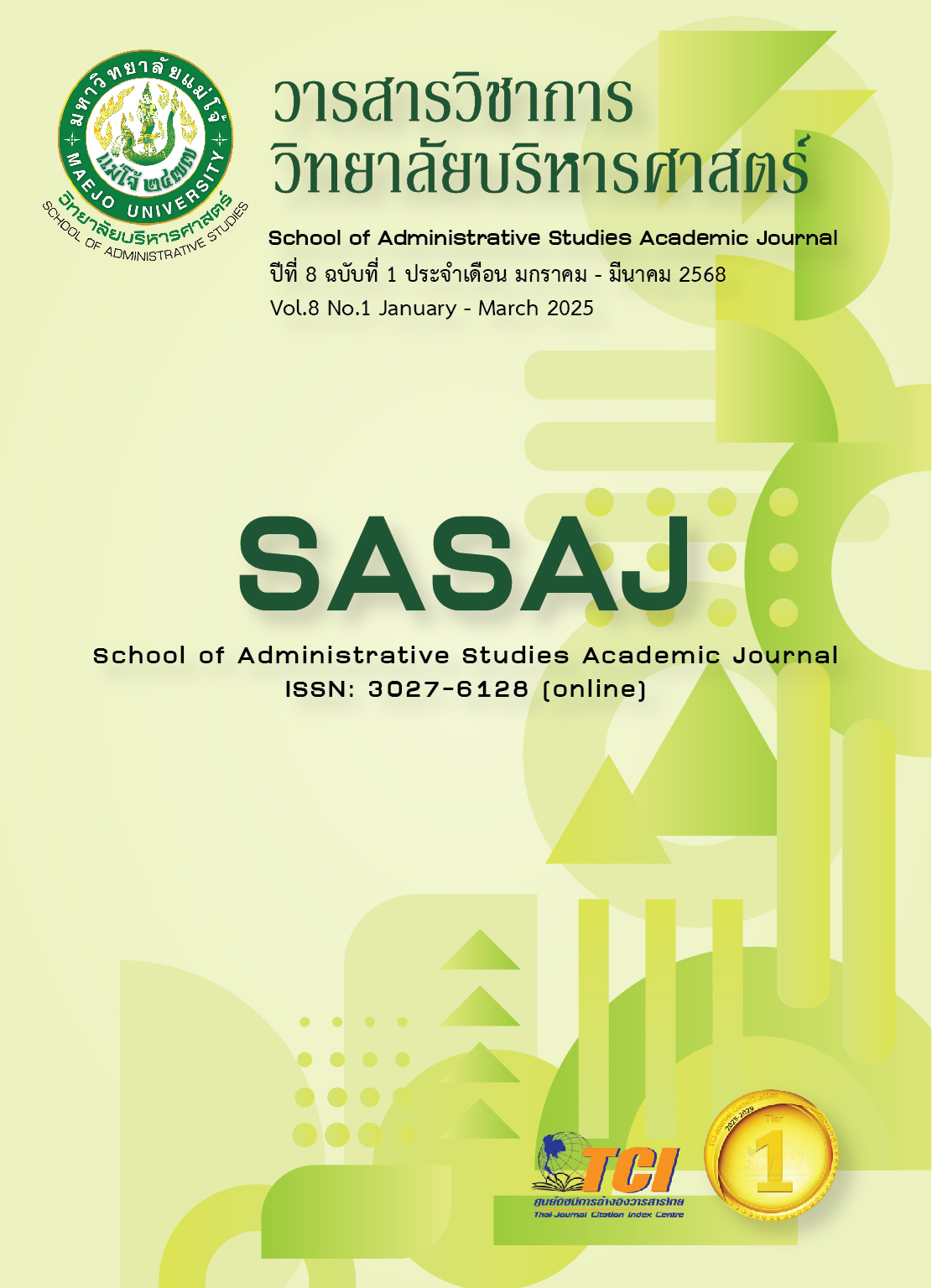ปัจจัยที่มีผลต่อการกล่อมเกลาทางการเมืองอัตลักษณ์ทางการเมือง และลักษณะบุคลิกภาพของนักการเมืองของเยาวชนในประเทศไทย
Main Article Content
บทคัดย่อ
วัตถุประสงค์ของงานวิจัยนี้มุ่งศึกษาอิทธิพลขององค์ประกอบของการกล่อมเกลาทางการเมืองและอัตลักษณ์ทางการเมืองที่มีผลต่อการทำนายลักษณะบุคลิกภาพของนักการเมือง การกล่อมเกลาทางการเมืองให้มีผลต่อลักษณะบุคลิกภาพนักการเมืองไทยในสมัยปัจจุบันจำเป็นต้องนำเอาการยอมรับของเยาวชนคนรุ่นใหม่ที่มีอายุระหว่าง 15-25 ปีมาพิจารณา และด้วยเหตุนี้ผู้วิจัยจึงได้รวบรวมความเห็นของกลุ่มตัวอย่างทั่วประเทศจำนวน 1,200 คน และนำกลับมาวิเคราะห์ผลด้วยสถิติวิเคราะห์ถดถอยพหุคูณ
ผลวิจัยพบว่า ปัจจัยที่มีผลต่อการกล่อมเกลาทางการเมืองจากสถานศึกษามีอิทธิพลพยากรณ์ต่อลักษณะบุคลิกภาพนักการเมืองได้อย่างมีนัยสำคัญทางสถิติที่ระดับ .00 และ มีคะแนนมาตรฐานที่ .16 กับผลทดสอบ t = 4.26 (Sig. 000) นอกจากนี้ ปัจจัยที่มีผลต่อการกล่อมเกลาทางการเมือง เช่น ครอบครัว การใช้สื่อสังคม มีอิทธิพลอย่างมีนัยสำคัญทางสถิติที่ระดับ .00 มีผลทดสอบ t = 3.61 (Sig. 000) คะแนนมาตรฐาน .10 และคะแนนมาตรฐานเท่ากับ .10 ผลทดสอบ t = 2.88 (Sig. 000) ตามลำดับ อย่างไรก็ตาม องค์ประกอบอัตลักษณ์ทางการเมืองด้านคุณค่าทางการเมืองมีผลต่อการทำนายลักษณะบุคลิกภาพนักการเมืองไทยได้อย่างมีนัยสำคัญทางสถิติที่ระดับ .00 และมีคะแนนมาตรฐานเท่ากับ .50 ผลทดสอบ t = 27.17 (Sig. 000) นอกจากนี้ องค์ประกอบของอัตลักษณ์ทางการเมือง เช่น คุณค่าทางการเมือง ความเชื่อทางการเมือง ความสนใจทางการเมือง และระบบพรรคการเมือง ร่วมกันพยากรณ์ต่อลักษณะบุคลิกภาพนักการเมืองอย่างมีนัยสำคัญทางสถิติที่ระดับ .01 กับมีสัมประสิทธิ์ถดถอย R2 .50 ความคลาดเคลื่อนสะสม .42 ความแปรปรวน F = 298.72 (Sig. 000)
Article Details

อนุญาตภายใต้เงื่อนไข Creative Commons Attribution-NonCommercial-NoDerivatives 4.0 International License.
ลิขสิทธิ์
เอกสารอ้างอิง
ประสพชัย พสุนนท์. (2557). ความเชื่อมั่นของแบบสอบถามในงานวิจัยเชิงปริมาณ. วารสารปาริชาต มหาวิทยาลัยทักษิณ, 27(1), 144-163.
ปุญชรัสม์ ธนภูมิศิริพงษ์. (2562). 20 กันยายน วันเยาวชนแห่งชาติ. สืบค้นจาก https://www.ubu.ac.th/web/student/news/17012/
วีระศักดิ์ จินารัตน์. (2564). ระเบียบวิธีวิจัยสมัยใหม่. อุบลราชธานี: ยงสวัสดิ์อินเตอร์กรุ๊ป.
Aichholzer, J., & Willmann, J. (2020). Desired Personality Traits in Politicians: Similar to Me but More of a Leader. Journal of Research in Personality, 88, 1-11. https://doi.org/10.1016/j.jrp.2020.103990
Ali, R. (2016). Social Media and Youth in Pakistan: Implications on Family Relations. Global Media Journal, 14(1), 1-6.
Alodat, A. M., Al-Qora'n, L. F., & Hamoud, M. A. (2023). Social Media Platforms and Political Participation: A Study of Jordanian Youth
Engagement. Social Sciences, 12(7), 1-18. https://doi.org/10.3390/socsci12070402
Anwar, M., & Jan, M. (2010). The role of media on the political socialization: the case of Pakistan. The Dialogue, 5(3), 212-227.
Bleidorn, W., Hopwood, C. J., & Lucas, R. E. (2018). Life events and personality trait change. Journal of Personality, 86(1), 83-96. https://doi.org/10.1111/jopy.12286
Campos, C. F. S., Hargreaves Heap, S., & Leite Lopez de Leon, F. (2016). The political influence of peer groups: experimental evidence in the classroom. Oxford Economic Papers, 69(4), 963-985.
Dahl, R. E. (2004). Adolescent brain development: A period of vulnerabilities and opportunities. Annals of the New York Academy of Sciences, 1021(1), 1-22. https://doi.org/10.1196/annals.1308.001
Farkas, J., & Schwartz, S. A. (2018). Please like, comment and share our campaign! How social media managers for Danish political parties perceive user-generated content. Nordicom Review, 39(2), 19-33. https://doi.org/10.2478/nor-2018-0008
Han, Y., & Demircioglu, M. A. (2016). Accountability, Politics, and Power. In A. Farazmand (Ed.), Springer Nature Link (pp. 1-8). Florida, FL: Springer International. doi: 10.1007/978-3-319-31816-5
Hyman, H. H. (1959). Political socialization: A study in the psychology of political behavior. New York, NY: Free Press.
Jensen, L. A., & Arnett, J. J. (2012). Going global: New pathways for adolescents and emerging adults in a changing world. Journal of Social Issues, 68(3), 473-492. doi:10.1111/j.1540-4560.2012.01759.x
Kenna, J. L., & Hensley, M. A. (2019). Utilizing social media to promote civic engagement in the social studies classroom. The Social Studies, 110(2), 86-94.
Kezar, A., & Eckel, P. D. (2002). The Effect of Institutional Culture on Change Strategies in Higher Education; Universal Principles or Culturally Responsive Concepts?. The Journal of Higher Education, 73(4), 435-460.
Khan, A. Y., Razi, A., & Rehan, M. (2013). Impact of Mass Media in Pakistan on Social, Ethical and Economic Grounds.International Journal of Economic Resources, 4(3), 1-20.
Kriesi, H., Grande, E., Dolezal, M., Helbling, M., Höglinger, D., Hutter, S., & Wüest, B. (2012). Political Conflict in Western Europe. UK: Cambridge University Press. https://doi.org/10.1017/CBO9781139169219
Kushin, M. J., & Yamamoto, M. (2010). Did social media really matter? college students' use of online media and political decision making in the 2008 election. Mass Communication and Society, 13(5), 608-630. doi: 10.1080/15205436.2010.516863
Moon, S. J., & Bai, S. Y. (2020). Components of digital literacy as predictors of youth civic engagement and the role of social media news attention: the case of Korea. J Child Media, 14(4), 458–474.
Myoung, E., & Liou, P. (2022). Adolescents' Political Socialization at School, Citizenship Self-efficacy, and Expected Electoral Participation. Journal of Youth and Adolescence. 51(2), 1-12.
Porter, T. J. (2013). Moral and political identity and civic involvement in adolescents. Journal of Moral Education, 42(2), 239-255. doi:10.1080/03057240.2012.761133
Quintelier, E. (2015). Engaging adolescents in politics: The longitudinal effect of political socialization agents. Youth & Society, 47(1), 51-69. https://doi.org/10.1177/0044118X13507295
Smith, A. D. (1994). Natsional'na identychnist. Ukrainian: Osnovy Publishing.
Stromback, J., & Shehata, A. (2010). Media malaise or virtuous circle? Exploring the causal relationships between new media exposure, political new attention and political interest. European Journal of Political Research, 49, 575-597.
Thailand in brief. (2023). General Information. Retrieved from https://elcim.ssru.ac.th/pannalin_su/pluginfile.php/37/block_html/content/Thailand%20in%20brief%20%20text%20for%20reading.pdf


